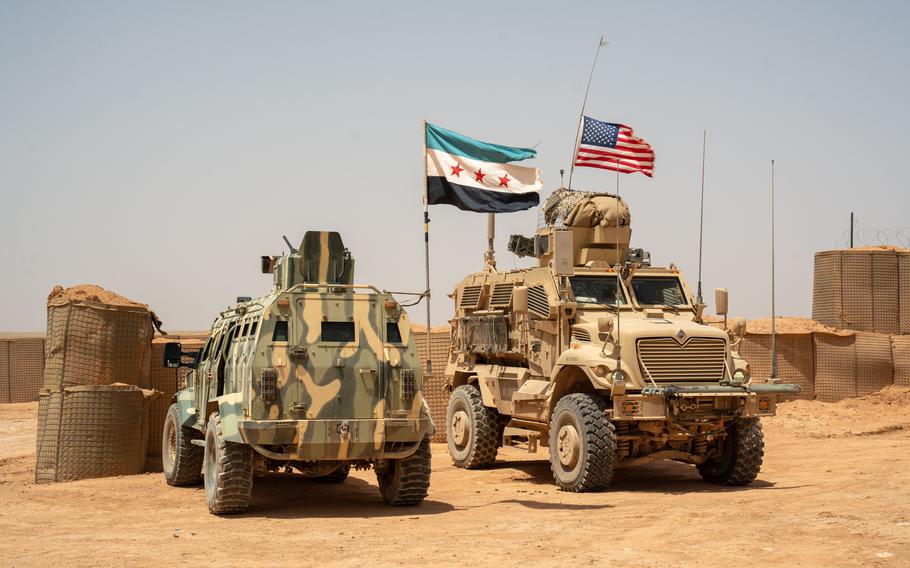
A Syrian Free Army vehicle idles beside a U.S. Army vehicle near al-Tanf Garrison, Syria, on May 6, 2023. The number of U.S. bases in Syria will eventually drop from eight to one, Tom Barrack, the American ambassador to Turkey and special envoy to Syria, said June 2, 2025, in an interview with a Turkish TV station. (Terry Vongsouthi/U.S. Army)
The number of U.S. bases in Syria will be pared from eight to one, the American ambassador to Turkey and special envoy to Syria said this week in an interview with a Turkish TV station.
Tom Barrack’s comments Monday on the impending consolidation were confirmed to Stars and Stripes by a U.S. official, who was granted anonymity to discuss sensitive matters.
Reduction of the U.S. military’s footprint in Syria is a reflection of shifting American policy, Barrack said in the interview, which was published in Turkish.
For more than a decade, the U.S. has been conducting Operation Inherent Resolve, a mission aimed at defeating the Islamic State group in Syria and neighboring Iraq.
Since ISIS’ territorial defeat in 2019, the U.S. has consistently maintained at least several hundred troops in northeastern Syria to train and assist Kurdish partners in the Syrian Democratic Forces, as well as a small contingent near the southern border with Jordan and Iraq.
Following an agreement the SDF made in March to merge forces with the interim government in Damascus, the Pentagon said it will reduce the American troop level in the country from 2,000 to less than 1,000 in the coming months.
Fox News, citing U.S. officials, reported Monday that 500 troops had left bases in northeastern Syria, including Mission Support Site Green Village and Mission Support Site Euphrates, which was handed over to the SDF.
The top priority for the U.S. are the 9,000 ISIS fighters currently held in detention centers maintained by the SDF.
During a recent Middle East visit, President Donald Trump urged his new Syrian counterpart, interim President Ahmad al-Sharaa, to assume responsibility for the prisons where U.S. forces for years have trained and equipped their Kurdish partners.
But it will likely be months or years before the new government is stable enough to do so, experts say.
Barrack’s announcement came as the United States and other world powers try to navigate shifting dynamics in the Middle East following the collapse of the Assad family’s regime in Syria in late 2024 after more than a half-century of rule.
Trump’s Syria policy will not be close to those of the past 100 years because none of them worked, Barrack said.
The U.S. is also taking steps to ease decades of economic sanctions on Syria as the interim government works to gain control and stability.
In a congressional hearing last month, Secretary of State Marco Rubio said that without U.S. support, the country faces “potential collapse and a full-scale civil war of epic proportions.”